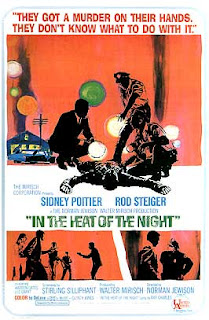In The Heat Of The Night, starring Rod Steiger as Southern police chief Bill Gillespie and Sidney Poitier as Northern officer Virgil Tibbs, was, if nothing else, one of the most important films of its era. With the Civil Rights Act of 1964 being enacted three years earlier, many white people believed racism issues were officially over, while black people responded, “Uh, no.” At that time, few films dared to take on the dramatic conflicts between blacks and whites, especially while portraying the South in an angry, edgy fashion rather than morally confused. The success of the film also spawned two sequels and a television series.
After a prominent Mississippi figure is murdered, the police departments spots Tibbs, an African American they are unfamiliar with, waiting at the train station late at night. For no other real reason than the color of his skin, he is immediately considered a suspect. Once he is taken to the station, however, the officers discover Tibbs himself is a police officer from Philadelphia, in town visiting family. The Philadelphia police department requests that Tibbs help Mississippi’s officers through the murder case, which Tibbs reluctantly does. We won’t spoil the ending since you’ve only had 44 years to see this movie, so it is still too soon. But as you would expect, both the Caucasian officers and the African American Tibbs struggle with believing in one another.
Many iconic cinematic moments take place in this movie. The most famous example comes when Gillespie sarcastically asks what the Philadelphia officers call Virgil, and he answers, “They call me MISTER TIBBS!” The line was named the 16th greatest movie quote by the American Film Institute. Also, another scene features a white character named Eric Endicott slapping Tibbs in the face, which prompts Tibbs to slap him back. This was one of the first times a major motion picture depicted a black character reacting to being provoked by a white character with violence. It is said Poitier would only be a part of the movie if he was allowed to slap Endicott back – and the scene could not be edited out in any showing.
The 1968 Academy Awards were postponed for two days. Originally the show was scheduled to take place on April 8, but Dr. Martin Luther King Jr.’s assassination earlier that week forced a postponement. When the awards were held on April 10 and In The Heat Of The Night was selected as the winner, a large portion of the crowd was audibly angry, questioning if it had won perhaps due to the aforementioned tragedy. It certainly did face stiff competition with other great films such as The Graduate, Bonnie & Clyde, Guess Who’s Coming To Dinner, and Dr. Doolittle, though the last of which most people agree was significantly better when Eddie Murphy remade it 31 years later.
So that’s the history. But what was the consensus of Team Movie Meats?
JIMI: (1.37 Acting + 1.9 Visuals + 0.40 Wow + 1.53 Story + 1.67 Enjoyability) = 6.87
TRACY: (1.71 Acting + 1.37 Visuals + 0.72 Wow + 1.00 Story + 1.72 Enjoyability) = 6.52
RACHEL: (1.63 Acting + 0.93 Visuals + 1.72 Wow + 1.38 Story +1.55 Enjoyability) = 7.21
TAD: (1.51 Acting + 0.78 Visuals + 0.40 Wow + 1.662 Story + 1.75 Enjoyability) = 6.102
NICK: (1.52 Acting + 1.48 Visuals + 1.38 Wow + 1.44 Story + 1.634 Enjoyability) = 7.434
FINAL: 6.83
Interesting score notes: Jimi’s overall score was almost the exact score as TMM’s average … Tad posted the highest Enjoyability rating, yet had the lowest overall score by a landslide … Rachel and Nick’s Wow Factor was more than a full point ahead of Jimi and Tad. The former duo was stunned with much of the racist commentary, while the latter stated they were not as shocked only because it was expected for this movie (though the “slap scene” certainly earned Wows from everyone) … Tracy had the highest Acting score and second-highest Enjoyability score, but her low Story score had her finish with the second-lowest overall score.
FAVORITE LINE: (tie) “They call me MISTER TIBBS!” (Poitier) and “There’s white time in jail and there’s colored time in jail. The worst kind of time you can do is colored time.” (Poitier)
RANDOM VISUAL: Gillespie’s yellow-tinted sunglasses. A bigot Southern police officer rocking yellow-tinted sunglasses in the late 60s? What is he, J-Lo?
MOVIE MEAT: Southern BBQ'd chicken and country fried steak.
TIME OF DEATH: 10:54 PM on January 5, 2011
NEXT UP: You Can’t Take It With You (1938), selected by Tad. *Note: Tad shockingly used his mulligan on his very first pick after originally selecting Terms of Endearment.



No comments:
Post a Comment